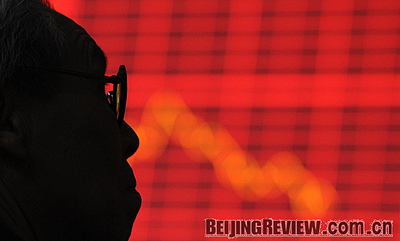|

RED MARKETS: When inflows of hot money peaked last year, they were blamed for pushing share prices on China’s mainland markets to unrealistic highs
In the last three months, the country's financial supervisory departments have conducted frequent but atypical investigations of hot money. They are trying to determine how much hot money is in the country and where it is going.
Hot money refers to large quantities of funds that move quickly in international currency exchanges because of speculative activities.
On April 19, the Central Government summoned relevant departments, including the central bank, Ministry of Finance, National Development and Reform Commission and State Administration of Foreign Exchange (SAFE) for a special meeting on hot money. After the discussion, the central bank led the departments in launching an investigation of hot money in China.
On May 29, the China Banking Regulatory Commission (CBRC) gave a report on hot money to the Central Government. The next day, local banking regulatory bureaus under the leadership of SAFE and the CBRC held in-depth discussions about hot money.
On June 24, Hu Xiaolian, central bank's Vice Governor and head of SAFE, traveled to Dalian, Suzhou and Wuhan to conduct on-site checks about how to strengthen the supervision of transnational capital flows in these cities. In the meantime, SAFE issued a notice ordering all locally incorporated banks, including foreign banks incorporated on the mainland, to send renminbi account data for non-local resident account holders to help track down illegal flows of hot money in the country.
SAFE, the Ministry of Commerce and the General Administration of Customs decided to build a nationwide network to supervise and manage incoming and outgoing foreign exchange settlements as of July 14 in an attempt to control hot money flows.
They did so, because hot money is increasingly affecting inflation in the country as well as monetary policy.
"China is beset with runaway inflation and an increasing influx of hot money," said Zhang Ming, a researcher at the Institute of World Economics and Politics of the Chinese Academy of Social Sciences (CASS).
Guesstimates
The financial supervisory departments and economists cannot determine exactly how much hot money is in China. Currently, there are several different estimates, because hot money usually sneaks in and is hard to track. Zhang Haijun, an analyst at United Securities Co. Ltd., believes China's hot money influx started in 2005 when the country began to reform its foreign exchange system and gradually allow renminbi to float freely each day at a fixed range against other foreign currencies. As a result, expectations about the renminbi's appreciation grew because of international hot money's speculative nature.
| 